#ruta 66 magazine 2022
Text
Arctic Monkeys’ Interview on Ruta 66 Magazine, October Issue 2022
Translated by RatioMonkeys on Twitter
I ain’t quite where I think I am… are you?
The matter requires complete confidentiality, so it doesn’t leak into the treacherous ocean that is social media. The interview with Alex Turner will be in London, towards the end of July. The Car -code title: Suffolk Punch- won’t be published until October 21st. If listened in another device other than the original, the copy will self-destruct. Agents in the service of Her Majesty will descend upon the journalist from Ruta 66 at the slightest indiscretion. Shhh…
And here I am, before Town Hall Hotel, in Bethnal Green, taking one last puff of a cigarette before deciding to enter and face the frontman of one of the most successful British bands since 2006, when they released their debut album of a title that already indicated its idiosyncrasy, Whatever People Say I Am, That’s What I’m Not. That was not the first step, but the conclusion of two dazzling three years in which their fans, and the internet multiverse, had put them on the pedestal of valuable substance, a young rock band that, paradoxically, believed in the old principles: composing big songs, gathering those songs on a vinyl that enhanced them, playing them before crowds that would sing them at the top of their lungs.
“When I am in London, I stay here,” says an educated, youthful Alexander David Turner, recently showered, in designer jeans, summer jacket, comfortable boots. “In 2007, when I still lived in Sheffield, we created one of the Arctic Monkeys’ records here, in Shoreditch. Since then we always stay in the neighborhood, and in fact, I lived here for a couple of years. There is a nice park…”. Out of place as the international star that he is, the frontman of the Arctic Monkeys resides in L.A., as another northern English attracted by the Californian sunshine and the epicenter of spectacle. “I am not there as much as I was a couple of years ago”, he explains. “Well, I was in there months back. I am looking for a place to stay…”
The suite in which we are in, as the entire hotel, exudes a timeworn classic style that cushions luxury: 70s furniture of varnished wood that doesn't hide its scratches and fading but spotless vintage rugs. Sitting before coffee and scones, during the first hours of the morning, we enter the scene. Alex, amiable and shy, far away from the public image of a difficult interviewee or god-like singer, expresses himself in a choppy manner, as if his reasoning were questioning the words that he pronounces. At 36 years of age, he is seemingly cultured and has his own opinions. The sixty-something chronicler sighs with relief.
The Car is a brave album, without great outbursts, a trip that starts flat and that discovers its peaks and valleys as it goes. This tendency started in Tranquility Base Hotel + Casino, where you started writing on the piano…
Certainly, the previous album started taking everything in a direction that… [thinks]. Well, the truth is I don’t think you can go backwards in music. And even if the listener expects a big smash, I think I’ve probably made the effort for it not to appear anywhere, because that’s the way I think it should be. But you don’t have to feel it like something that’s unnatural, on the very contrary, I think the album sounds open, even more than the previous one, where we started to open ourselves more.
When you released Tranquility Base, some fans demanded you on social media to go back to the studio and re-record it with guitars. But an artist must take risks, and I don’t see any other band from your generation that has evolved so much.
I hope so! If I think about our attitude when we were 17 and we played in a garage, you know, a group of guitars, drums and bass, I see that it all had to do with the instinct of “what can we do with this”. When you start you barely know how to play guitar, but you hear this voice that tells you that this is what comes out when you play altogether with your mates. It all relies in a sort of presentiment. And I think this is still true in everything we’ve done so far, that voice that comes from somewhere and keeps talking to you, that sort of instinct that forces you to move in a certain direction.
So, basically, you follow your instinct…
Absolutely, yes. I certainly do at a creative level. And it’s not always the easiest, to follow your instinct, either on the creative field or on your life. Your mind interposes between what you really feel and what you think you should do. But it’s also true that, when you do pop music, sometimes it’s easier to follow your instinct.
From the outside, people may think that when you started you were wild, heavy, and now more sophisticated. But you have to remember that it’s not only about volume, but also about feelings, and these can be as effective as a guitar riff…
I completely agree with you. Sometimes even more, I think. You have to recognize that… [mumbles]. Because if now we tried to do the kind of music we did ten years ago, it wouldn’t seem like the right thing to do. We can turn the volume up for five minutes, but you don’t have the same kind of inspiration in that sound as if you go to the next place that you reach when you write the rest of the song. You can always go back to the big dramatic effect, I think it’s something I still seek, but hoping to do it in a different way. (*Translator note: Most of this paragraph doesn’t make sense in the original article in Spanish either. It looks like he said a bunch of nonsense and they transcribed it word by word*).
You can always go back to that initial energy, sure.
Yeah, of course, I hope so… Recently we’ve been rehearsing altogether for two weeks, playing old songs out loud, and we had a great time. You know, lifting our guitars up in the air and making a lot of noise. We still enjoy ourselves with our loud guitars and we could take this into the recording studio. Perhaps someday we will.
Does the rest of the band share this presentiment you talk about? You have been together for a long time and you are a solid organism, even when you are the main songwriter.
I think the answer is yes… Certainly they all share that presentiment and, even if it wasn’t like that, I’d say sometimes not only they share it, but also if they see that I’m unsure about whether to follow my intuition, they’ll most likely encourage me to do so, to go in the direction that I’m not brave enough to follow. I remember times during the recording of this album where I was the first one to let my mind get in the way and tell myself that perhaps we weren’t doing the right thing, but the rest of the band would always encourage me to follow that road. And I think this is one of the reasons why we are still together.
I don’t think there’s anything bad about being unsure either, otherwise you take the easy route, you do an album that sounds like the previous one, you sell music, you don’t create it…
Exactly. You are absolutely right.
How is your internal dynamic? What does each member contribute?
When we started and we played in the garage it was different, because the way we’ve recorded the last two or three records has been different. We don’t play all together in a room anymore, although we did it in the previous record, but this time the contribution of each of us has been more fragmentary. I remember that during the recording I spent some time with each of the band members, individually, one on one, to try to use some of their musical ideas, more twisted stuff.
For example…?
In the third song of the album, “Sculptures Of Anything Goes”, we worked together with Jamie, the guitarist, and he’d just acquired a Moog synthesizer. He was experimenting with that machine, creating a loop with the drum machine that inspired the song and he took it far away from the original idea. After some time, it went back to its origin and what ends up in the album is the sound of that idea summed up with the resulting song. Jamie contributes, apart from the stimulus, a will to grow, evolve and push the boundaries of our music. He’s the kind of musician who likes to experiment with the sound of an instrument, to manipulate it, rather than just playing it. That’s what he contributes to the group.
You’ve said that you like to write a song in the moment, without thinking about it too much, but in the last two records the process has been more elaborate. Isn’t that more tiring and mistaken than just to write it, record it and that’s it?
I haven’t worked with such immediacy for a long time. I like that idea of doing something that quick right now, today! [Laughters], but for some reason it hasn’t been like that. I think you just have the opportunity to do it a few times, perhaps during a long time, I don’t know… And I think I might do it again, but I believe that when you realize that you’re not doing it, it’s too late. And you think ‘I’ve done it for some time, but it has no use anymore’…
Obviously, there are no traces in “The Car” of those young Arctic Monkeys who brok through the British scene with fierce guitars and echoes from 1979 singing about teenage angst and living in the suburbs with big hits like “I Bet You Look Good On The Dancefloor”. Alex Turner has already said it: it´s their instinct, that force of destiny that made Alex Turner take another path on his side Project “The Last Shadow Puppets” , travel with the band to the Mojave desert and collaborate with Josh Homme for “Humbug”, finally take over America with “Suck It And See” or dress like a rockabilly for “AM”. The fact that he doesn’t conceive writing another “No. 1 Party Anthem” and that he portrays his burdens over silky funk, string arrangements and high-graduation ballads, is due to the fact that he knows that, in the art of songwriting, standing still equals to rusting, falling into irrelevance, failing.
You can sense from the lyrics that you’re trying to expose your intimacy without exposing yourself too much. I find it more gratifying than the obvious pop narrative: you offer all the pieces for the listener to construct what they imagine. Do the lyrics come out spontaneously or do they require a slow elaboration?
On one side, yes, they come out spontaneously. It’s something that happens in time and, as in other areas, a sort of writing style develops. Then, at some point, you find out what that style is and you can play with it. I like what you say about the pieces in the puzzle. I like the idea that the other part of that puzzle is the music, that the melody completes the lyrics, that you can feel that harmony between lyrics and music, a whole. The lyrics are just a piece of the puzzle, not something you have to decipher, but something that goes together with the music…
I am one of those who think that the listener is the one who completes the song. Big songwriters have confessed to me that they understood their lyrics decades after having written them. They’re a product of the subconscious…
I saw an article about Nick Cave in a magazine, about that wonderfull conference he wrote and developed, “The Secret Life Of The Love Song”, in which he talks about this. I found that idea fascinating. I think it’s absolutely true. Some of the things that come from that instinct we were talking about, from that poetic voice that we don’t completely understand and that we haven’t fully processed or thought, they find their way into your artwork. It happens a lot of times and you realize what it means long after; you remember the real life events that made you reflect and inspired you to invent it. I take the album’s lyrics with me [he takes them out of his jacket’s pocket] and I re-read them trying to make them make sense. We could compare them with the ones you brought [Laughters].
You seem to write about failed relationships, with poignant irony and a few drops of sadness; problems with your loved ones, with daily routines, with the outside world…
I think there is a certain level of search that never gets out of reach for the lyrics in some of my songs, although perhaps in this album it’s all more open to the outside…
You’ve cited poet John Cooper Clarke as an influence, are there any other authors that left a mark on you? What did you read while you were working on The Car?
There was a moment in time where I knew the answer to this question in relation to the songs that appear in our records. Right now, it’s harder to draw a line between what I was reading back then and what ends up on the album, but perhaps it’s there, I don’t know. When I started to write these songs I read Raymond Chandler, Phillip Marlowe’s novels, although I don’t see that on the album, but “The Long Goodbye” is mentioned at some point, the idea of The Long Goodbye appears. I was enjoying Phillip Marlowe…
In these lyrics, there’s a similar use of the sharp phrase in which Chandler was a master…
Yeah, and the attitude in Marlowe’s character. An attitude that I think is well represented in Robert Altman’s film, the way in which the character acts with his cat, I don’t know… Something I haven’t talked about is a book that perhaps is the one that holds the closest relation with the album, “In The Blink Of An Eye”, which talks about cinematographic montage, by Walter Murch…
Apocalypse Now… Coppola’s editor!
Exactly… Someone recommended it to me a few years ago, it’s a short book. I read it and found it very interesting. That work fascinates me, cinema montage, the way he describes it. At the beginning he explains his work at Apocalypse Now, the big amount of material they had and the long time they worked on the film’s montage, a lot of hours every day. What he tells is very interesting, how they did lots of cuts and undid them later. Do the maths, they worked for two years to end up with a single montage. There are a lot of things in that book that touch me directly, not only on a creative level, but also personal and beyond. Very interesting.
In The Car, was there a lot of material you had to select or discard?
Not on an Apocalypse Now level [Laughters]. But there was a bit of that. And to be honest I enjoyed the fact that the edition took us so long. We allowed things to exist, we edited them and then undid what had been done. There’s a thing he mentions in the book, a dinner with some friends of his wife. He explained what he did for a living and someone said: “So your job is to cut out all the bad stuff…”. At first he got offended, but then he understood that in some way it was like that, but that the hard part was to be able to see what was the bad stuff. The idea is that montage is not so much about gathering the fragments of something, but about discovering a path through the story you’re telling. There are a lot of things like that in the book.
Well, it’s also about the story flowing at its own rhythm. If a very good passage of what you have written doesn’t contribute to the progression of the story, it has to be discarded…
Yes, and sometimes it’s hard to cut it out. There are songs that contributed to this album but that are not in it anymore. There’s one I can’t take off my head, and I want to find the way to release it at some point, because I feel that it was almost like the pattern for the whole record, but in the end there was no room for it, it made everything feel, I don’t know, cumbersome.
Success is a double-edged sword and Alex Turner knows it well. Arctic Monkeys’ fans love to go to unheard lengths, but the band is always under suspicion by the specialized press. They have been in opportunistic politicians’ mouths who have compared them to the Beatles, and have been cautioned for banting at awards ceremonies, or merely for winning awards and showing up to receive them. They are still on their merry way, limited by that Sheffield rookie band with a strong Yorkshire accent, who listened to The Smiths, Velvet Underground, Oasis and The Strokes, while dreaming of leaving that loop of performances in pubs and dancehalls, which occurred steeply despite being denied to appear on live television. The Car places them on another level characterized by risked maturity and songs with a sophisticated excellence which underlines the ever-rough entrance into the adult world, love hangovers, and life traps. It will be curious to see how they are received by the public… and by critics.
On a sonic level, the album has many layers, lots of textures that need to stand out or hide. Is it here where your producer James Ford, who’s worked with you for a long time, helps with decision making?
He’s someone I trust much better than myself [Laughters]. That relation has gone through a lot, we’ve worked together a lot, and that leads to a mutual comprehension that is unmatchable. He is a part of the whole process, but I think that, on the topic of what needs to be discarded, here we’ve done a better job than we ever did. We’ve been capable of allowing everything to be the way it should be and have its own space. This was, I believe, much harder to do in the beginning because there was this feeling that everyone had to play all the time, while now we all take some distance and it’s probably more effective, since it allows things to flow their own way.
Is it because of the experience you’ve accumulated over all these years?
I think that has something to do, but also because these compositions allow and also insist in that it’s done taking turns. I feel it’s almost as if they were written like that, to be developed slowly, and the rhythm they are worked at is very important. It’s also important to have a vision of the big picture.
Let’s talk about how your voice has evolved. David Bowie, of course, would be a referent. Jarvis Cocker, Brett Anderson… How have you been improving as a singer?
Yeah, they are all references, of course. It’s true that my voice has changed. There’s a physical reason, your own growth, which alters it. But I think that’s the less important part, for I feel your way of singing has to match what you are trying to express. It’s hard to explain this with words. I think the sound of the voice helps, along with the melody, to the totality of the song.
Now you use it as an instrument, which is what great singers do: Sinatra, Nina Simone, Bowie, Marvin Gaye…
Once again, it’s a part of that puzzle you were talking about. The way you interpret a song is everything; sometimes you can make it mean different things depending on how you sing it. Those great singers you mention are technically very good, but in the beginning I didn’t care that much about that, and I’m happy that it was like that because our music didn’t require it. But I reached a point where I wanted to be a good singer. Nat King Cole! That song of his, “Where Did Everybody Go?”, I think it’s connected to all of that.
Do you suffer the syndrome of fame and success? You don’t look like the kind of person that feels comfortable with that, and it’s visible in your songs.
Well, sometimes I’ve had difficulties with some aspects of it. For me it’s a weird situation, although I don’t get chased on the street. They might stop me in some places, but normally it all goes well. And on the lyrics, since they are getting more open, I think there might be some of that, perhaps I’ve let some ideas related to that in my songs, things that I ignored in the past, because, well, who cares. But I don’t think that’s necessarily true nowadays, you can find a way to put it into a song.
YOU ONLY CALL ME WHEN YOU’RE HIGH
“Don’t get emotional, that ain’t like you/Yesterday’s still leaking through the roof, but that’s nothing new/I know I promised this is what I wouldn’t do/Somehow giving it the old romantic fool seems to better suit the mood”.
That’s how “The Car” starts, on the first verses of “There’d Better Be A Mirrorball”, preceded by dry hits of stentorian Philly Sould, confirming that the young man that wanted to be like The Strokes today aspires to the melodic depth of a crooner. Recorded at the Butley Priory Studios, Suffolk, and on the French La Frette, produced and mixed by James Ford, the band’s seventh studio album continues in that new style -atmospheric, confessional, solemn, poignant- with which the Arctic Monkeys surprised their fans on Tranquility Base Hotel + Casino.
The funk riff and Bowie vibes from “I Ain’t Quite Where I Think I Am”, the futuristic soul anointed in Moog of “Sculptures Of Anything Goes” -co-written by Jamie Cook- or the sustained euphoria of “Hello You” keep the pulse of an album that delves between raw and sophisticated, intimate and spectacular. A lagoon of brilliant surface and fathomless depths navigated by half times that catch you gradually. “Body Paint”, with those McCartney vibes, sounds as vaguely autobiographical as the rest (“For a master of deception and subterfuge/You’ve made yourself quite the bed to lie in/Do your time travelling through the tanning booth/So you don’t let the sun catch you crying”).
Ominous ballads follow, like “Big Ideas”, or the insidious, chimerical “Jet Skis On The Moat” and “Mr. Schwartz”, both co-written by Tom Rowley. And without understanding how we ended up here, “Perfect Sense” farewells a subtle, enigmatic collection where we shuffled between the bitter outcome of his penultimate romance with an American model and the nuisances of being, oh, a celebrity: (*Note from the translator: here goes a lyric snippet from Perfect Sense, but it’s written in Spanish. It’s stupid because it’s the final bit of the song, but they didn’t put the original version anywhere. What follows is a literal translation*). “Sometimes I wrap my head around it and it makes perfect sense, keep reminding me that it ain't a race when my invincible streak turns into the final straight, if that’s what’s needed to say goodnight, be it that way”.
#interview#translation#ruta 66 magazine 2022#arctic monkeys#alex turner#the car era#it's a five-page interview and bless the translator for being so fast
120 notes
·
View notes
Quote
I remember times during the recording of this album where I was the first one to let my mind get in the way and tell myself that perhaps we weren’t doing the right thing, but the rest of the band would always encourage me to follow that road. And I think this is one of the reasons why we are still together.
Alex Turner on The Car, July 2022 (Ruta 66 Magazine)
#I love this#they sure have a special bond#we all know what it's like to doubt yourself#alex included#it's nice to have people who encourage us#and for alex those people are his bandmates#special#arctic monkeys#alex turner#quote#interviews#the car era#favorite
109 notes
·
View notes
Text
Arctic Monkeys Interviews etc… (1)
(huge thanks to those who’ve posted these before & sources - credits to them & the magazines)
Entertainment Weekly:
Flood Magazine:
Mojo Magazine:
Alternative Magazine:
NME:
The Guardian:
The Rolling Stones - Germany:
Big Issue Magazine:
Ruta 66:
Musik Express:
Spin Magazine:
10 notes
·
View notes
Text
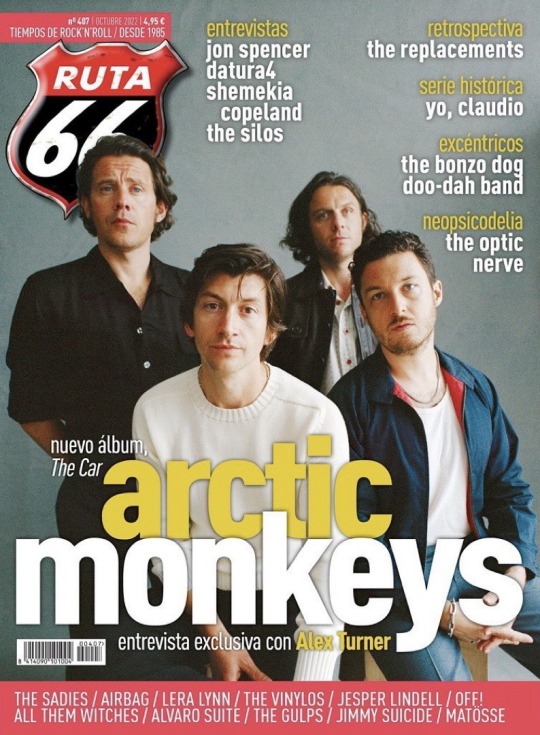
Arctic Monkeys - Ruta 66 Magazine October 2022
#anskdkhsjk Alex#arctic monkeys#alex turner#jamie cook#matt helders#photoshoot#the car#mypost#nick omalley
5 notes
·
View notes
Photo

THE GRASSLAND SINNERS presentan 'BEING ME', nuevo adelanto de su próximo disco.
La canción es una oda a la autenticidad personal y cuenta con la colaboración de lujo del saxofonista Dani Nel.lo
Se trata del cuarto single de adelanto del segundo disco de estudio de los barceloneses, que verá la luz en octubre
Fechas de conciertos:
05/08/2022 - Fiesta Mayor de Sant Martí Vell (Girona).
21/08/2022 - La Traviesa (Torredembarra).
03/09/2022 - Fiesta Mayor de Juià (Girona).
07/10/2022 - Sala Wolf (Barcelona) - Presentación en directo del nuevo disco.
ESCUCHA SU SINGLE 'BEING ME' AQUÍ
youtube
La parroquia rock está de enhorabuena. The Grassland Sinners presentan hoy 'Being Me', su nuevo single y videoclip de adelanto de su esperado álbum, así como las primeras fechas de conciertos, incluida la presentación oficial del disco en Barcelona el 7 de octubre (Sala Wolf).La banda barcelonesa publicará en octubre su nuevo álbum con su nueva formación y la producción de Dani Alcover (Héroes del Silencio, Arizona Baby, Dover, Sex Museum). Por lo pronto ya podéis disfrutar de cuatro vigorosos adelantos del mismo: 'Being Me' (que hoy os presentamos, junto a su videoclip), 'Paradise', 'Double Trouble' y 'Kill The Mood'.
'Being Me' es el nuevo single de The Grassland Sinners, sin duda un tema lleno de groove. En este la banda de Barcelona cuenta con la colaboración especial del saxofonista Dani Nel·lo, un referente de la escena del rock y el rhythm & blues en España. Además, el single viene acompañado de un nuevo videoclip, dirigido por Marc Borràs y producido por Katua Films.
La canción defiende la idea de "ser uno/a mismo/a": despojarse de lo artificial y lo superfluo y quedarse con lo esencial, que suele ser lo que realmente nos hace felices. Al igual que el resto del álbum, está grabada en los estudios Cucumber Factory (Mataró) y producida por Dani Alcover (Dover, Heroes del Silencio, Arizona Baby, Sex Museum). 'Being Me' está ya disponible en todas las plataformas digitales.
Su anterior trabajo, 'Let It Ride', les valió el reconocimiento de todos los amantes del rock y de la crítica musical especializada en esta materia gracias a un sonido que les acerca a formaciones como The Black Crowes, Allman Brothers Band o Drive-by Truckers.
Hoy damos la bienvenida a una banda que tiene mucho que decir al panorama rock: The Grassland Sinners. Se trata de una formación de rock clásico nacida en Barcelona a finales de 2015 y que han conseguido el beneplácito de la parroquia rockera de la ciudad. Tras ganar un buen puñado de concursos y publicar su álbum debut ‘Let It Ride’ (2017), el grupo se presentó en directo por 40 ciudades españolas, compartiendo escenario con bandas como '77, Still River, Rodeo Rose o The Mothercrow, y finalizando su primera gira Let It Ride On Tour ‘17-18 en el Rock Pels Xuklis Festival de Barcelona (junio 2018).
Tras un cambio de miembros a finales de 2018, la banda la integran ahora: voz principal Jacin Castrillo (Bigday Breaker), guitarra Aleix Lozano (Willy & The Poorboys), teclados Ferran Bruach (Please U2, El Hermano Malaquías), bajo David Mani (The Golden Grahams, Electric Boots) y batería Edu Rodríguez (Onyric Joy, Rock The Night).
Tanto el disco ‘Let It Ride’ como sus directos recibieron muy buenas críticas, tanto por parte del público como de medios: Ruta 66, Rock Estatal, Rock On Magazine o Dirty Rock Magazine, entre otros. En 2019 presentan el single y videoclip ‘Another Flavor’, y se embarcan en la nueva gira Back On Tour ‘19 por las principales ciudades del país, finalizando de forma inmejorable con su participación en el Calella Rock Fest y en el Back To School Festival Ibiza en octubre de 2019.
Como tantas otras bandas han hecho, durante la pandemia del Covid-19, aprovecharon para componer las canciones de su segundo álbum, el primero con la formación actual de la banda. En esta ocasión apuestan fuerte y deciden contar con Dani Alcover (Dover, Héroes del Silencio, Arizona Baby, Sex Museum...) como productor del nuevo disco, que será publicado después del próximo verano.
0 notes
Text
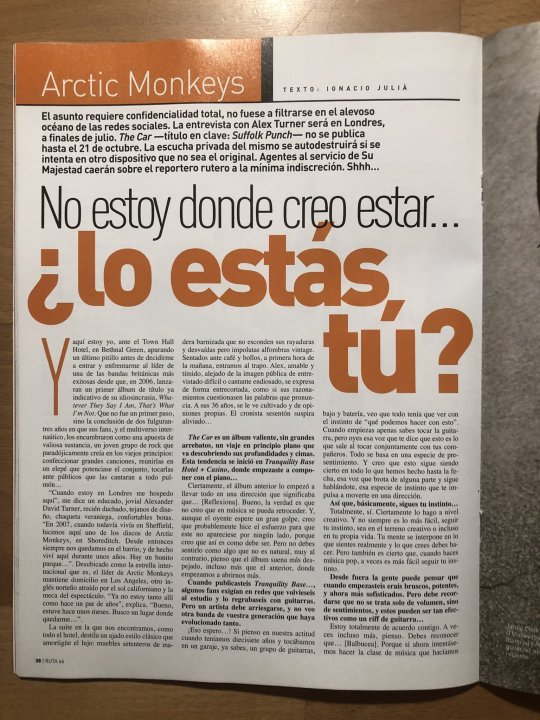
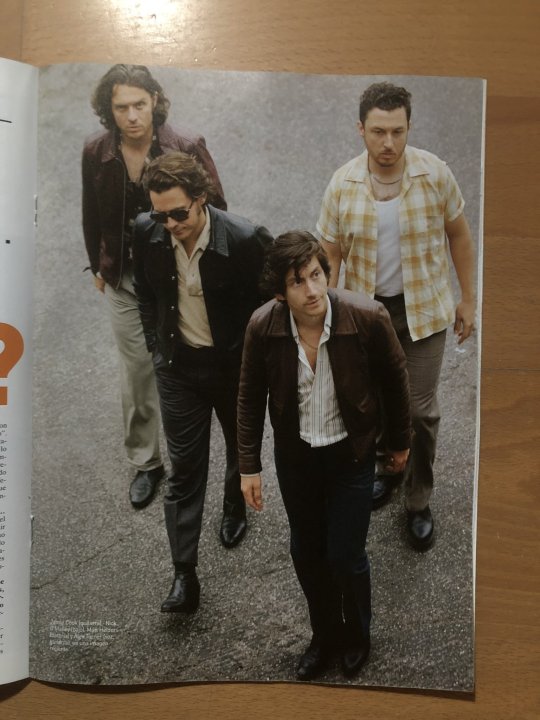
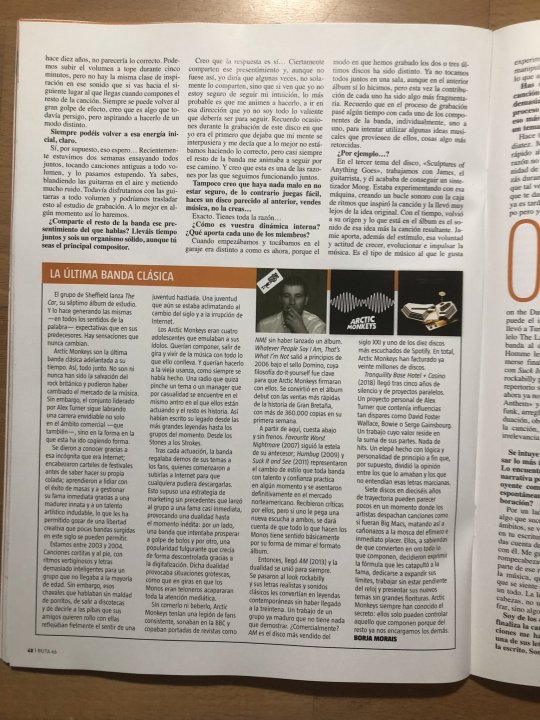
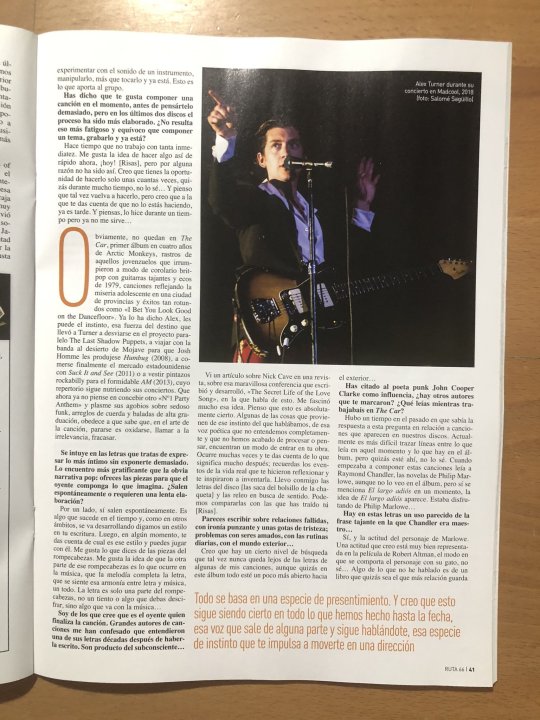
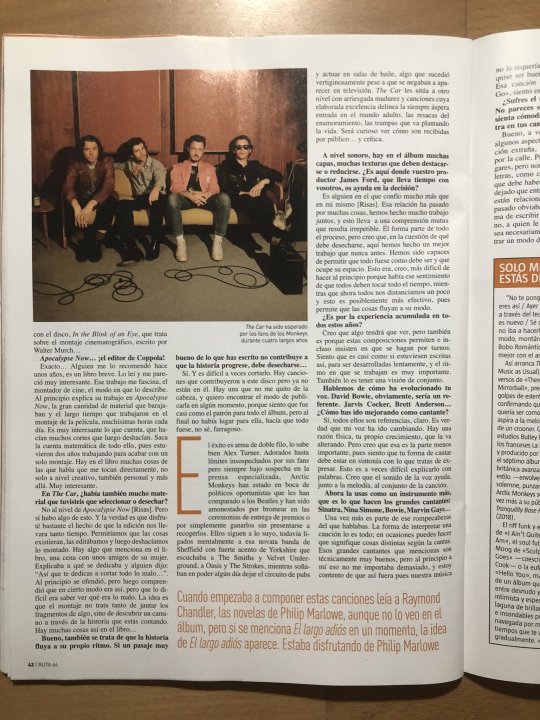
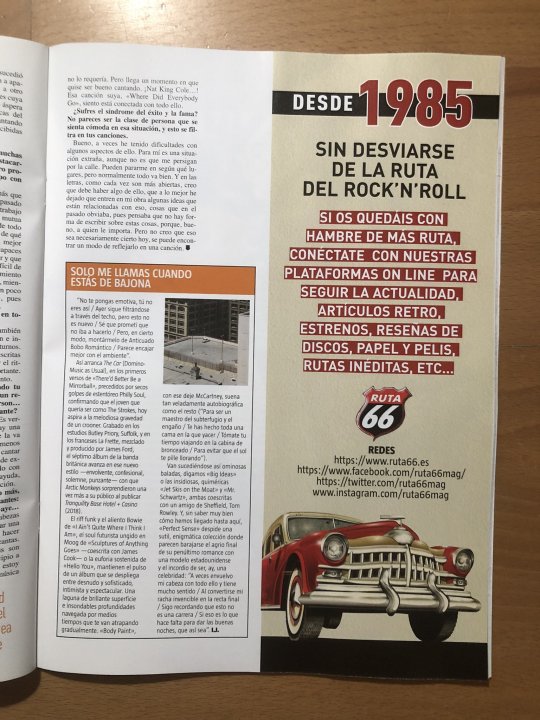
Arctic Monkeys' interview on Ruta 66 Magazine, October issue 2022.
#magazine#interview#arctic monkeys#the car era#ruta 66 magazine 2022#wish there'll be summarization or translation of this later
40 notes
·
View notes
Note
Hello! I hope this isn’t too much of a disturbance, but could you please give me the links to all of the (written) interviews we’ve had so far during this era? Like all of the ones we’ve got since August, please? Thank you :)
Hi anon, I'm glad to help you list all the interviews that have already been published so far.
Alex's interview with L'Equipe Magazine about sports, 13/08/2022: https://arcticmonkeysus.com/forums/index.php?/topic/17655-new-interview-with-alex-turner-about-sports/
Interview with Big Issue, 29/08/2022: https://privatter.net/i/6854651
Another article published by Big Issue, 29/09/2022: https://www.bigissue.com/culture/music/exclusive-7-things-alex-turner-revealed-to-us-about-new-arctic-monkeys-album-the-car/
Alex's interview with Ruta 66 Magazine, October Issue 2022: https://twitter.com/RatioMonkeys/status/1575647736887922691
Alex's interview with Rolling Stone Germany, October Issue 2022: https://docs.google.com/document/d/1a6Rzi5yUPpagc2CxeQwDGkD7S_qEM9NA98it_d_hE_s/edit
Alex's interview with Guardian, 30/09/2022: https://www.theguardian.com/music/2022/sep/30/arctic-monkeys-alex-turner-im-comfortable-with-the-idea-that-things-dont-have-to-be-a-pop-song
96 notes
·
View notes